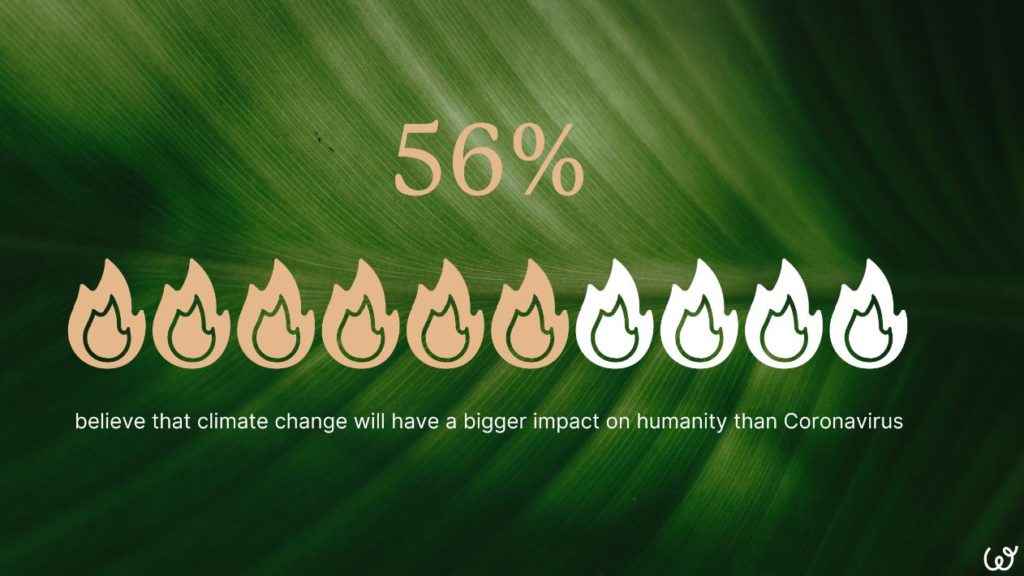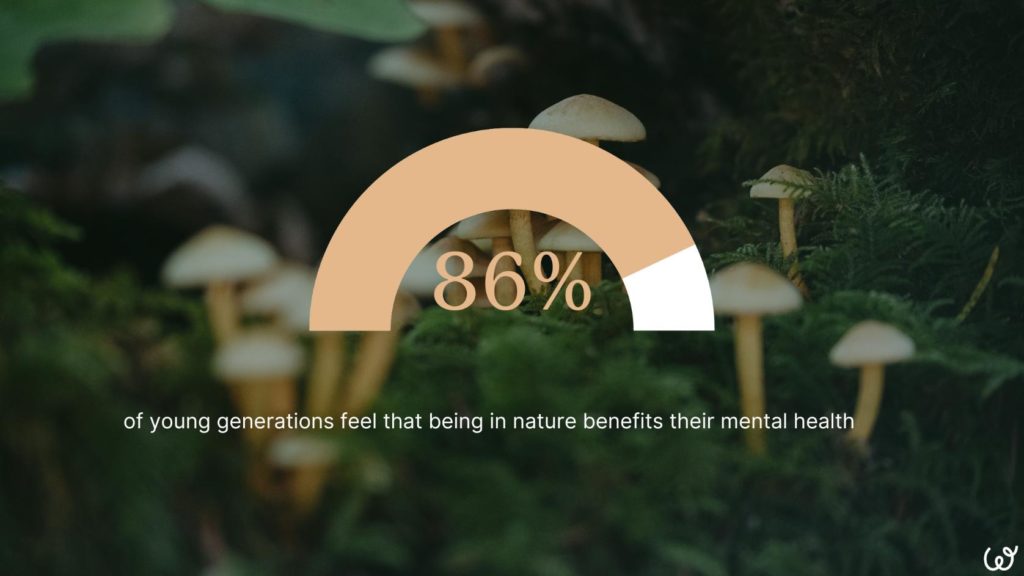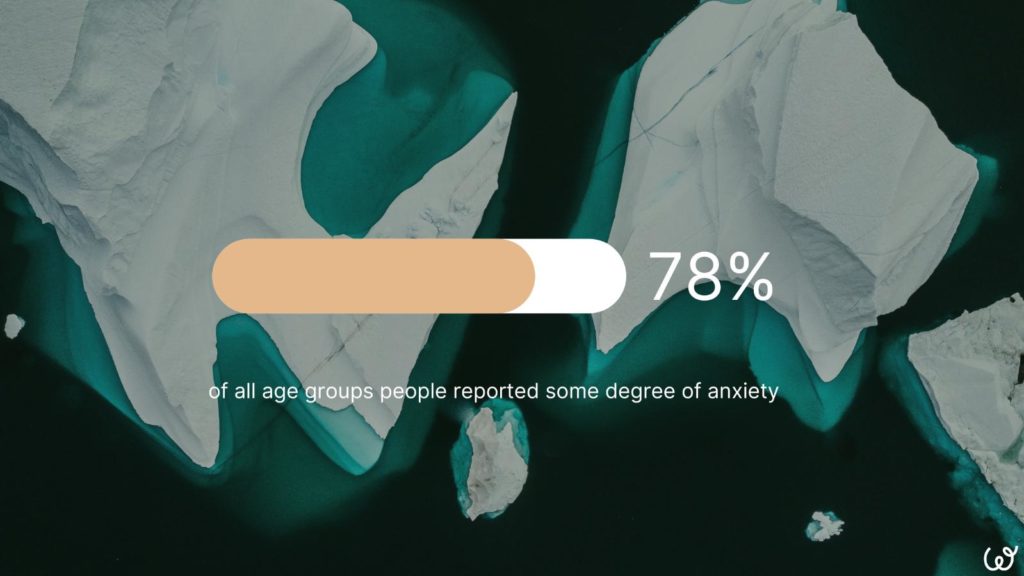Feeling eco-anxious is not a widely discussed topic in the public. Yet the following eco-anxiety statistics show that the majority of people experience this emotion.
The limited research that has been done shows us that climate anxiety is not only a problem for the youth, rich, or women. It’s a feeling that concerns us all.
Yet blind spots remain because most climate anxiety research so far is coming from the United States, United Kingdom, and wealthier EU countries. Global studies that deep dive into national differences need to be done to get a better picture.
Yet, there are a few that we will mention below. They paint the picture that these numbers can give us a glimpse of the global perspectives on eco-anxiety.
In the business world, the saying goes: “Only what gets measured gets improved“. Hopefully, these statistics hopefully help enhance the current situation by getting more attention to eco-anxiety.
What have the eco-anxiety statistics revealed about our feelings toward climate change?
75% of people in Great Britain worry about climate change
That 75% of people are worried about climate change shows that the topic has entered the mainstream and that opinions are not as divided as often portrayed in the media or comment sections on social media.
19% responded that they didn’t feel anything, meaning only 6% were not worried at all.
When 75% of the population is worried, this should sooner than later be reflected in politics & business practices in the future.
41% of people reported being very much or extremely fearful of climate
While we all face the same climate and biodiversity loss challenges, we experience the situation differently.
Our research with Wildya showed us this as well. Eco-anxiety is not felt the same for everyone.
Our own assumption was that, most likely, only a small group of people experience climate anxiety severely.
But we were wrong; this study in the U.K. showed that a whopping 41% fear much or extremely fearful when it comes to eco-anxiety.
So if you feel it too, you are not alone.
56% believe that climate change will have a bigger impact on humanity than Coronavirus

Most people think that Covid was only the start and that climate change will drastically change our lives.
Covid brought everything to a halt, resulted in almost 7 million deaths, and confined us for months.
Yet, people share that the effects will be even more severe for us.
One positive takeaway from that time is how fast we can change when needed and the power of global collaboration.
It is time to use those learning for the climate & biodiversity crisis.
Fear about climate change is high among all classes
Often labeled as a luxury problem, eco-anxiety is not a matter of income. 42% of middle & upper compared to 39% of the working class.
While the research found a slight difference of 3%, it shows that this problem seems to affect people with lower income as much as more fortunate people.
If trends continue, it could become a similar priority to unemployment and crime, the current priorities that worry the poorer population the most.
The bigger difference was actually measured not between different income levels but by gender.
79% of women are concerned about the environmental crisis vs. 72% of men
8 out of every 10 women (approximately 79%) expressed being very or somewhat concerned about climate change.
Which is notably higher than the percentage of men who reported similar levels of concern, which stands at 72%.
While we can see some significant differences, it yet reveals again that the gap might not be as high as expected.
In the public discourse, people often have prejudices that only women would care about climate and nature; at least, according to this research, that is not the case.
12% of eco-anxious people made a lot of lifestyle changes in 2021
12% of people who said they worry about the climate made great efforts to change many of their daily habits, resulting in a more sustainable lifestyle.
Surprisingly, 90% of the people also answered that they made some changes in their daily lifestyle.
So it seems that the change is starting, yet it still shows a big gap between concern or feeling anxious and actually catalyzing this into daily actions.
It seems like there is still some homework for us to do to empower people to lead the change.
26% of eco-anxious people changed how they spend, 65% revised their waste management, and 3% went to more protests
In another study, they took a deeper dive into which lifestyle changes people with climate anxiety would choose.
After all, not all lifestyles deliver the same impact, and not everyone can change their lifestyle overnight.
These are key takeaways about the lifestyle changes they made to combat climate change. From the top to the least:
- 65% changed their waste management;
- 33% changed the food they consume;
- 26% changed the way they spend their money;
- 25% changed the clothes they buy;
- 25% changed the way how they travel;
- 24% changed who they voted for;
- 22% changed the companies they shopped from;
- 12% changed the media they follow;
- 3% said they are going to more protests.
While reducing waste and recycling are great first actions, we need to do more.
👉 Join the Eco-Allies Community to find support and discuss with like-minded people!
What does the climate change research show about the environmental crisis’ impact on young people’s mental health?
Most research about eco-anxiety has focused on young adults 16-25 years old, which is why we decided to give it an extra section.
Even though you might be older, the insights into climate anxiety can still be very informative for you.
59% of young adults are extremely worried about climate change
More than half of our young people worldwide are sharing with us that they are extremely worried about climate change.
That should be alert enough for us.
They will spend more time on this planet than older generations and see that the current environmental destruction is still outpacing nature restoration.
They alone won’t be able to turn this around, so the best help to lighten their burden is for the older generations to collaborate with them to create a better future.
45% say eco-anxiety somehow affects their daily lives
Mental health challenges become especially severe for individuals when they start to affect their daily lives and functioning.
Unfortunately, almost half of young adults worldwide feel that their eco-anxiety is affecting them in their daily lives.
Wouldn’t you agree that young adults’ daily life should be focused on studying, enjoying their youth, and having a great time?
It seems like right now, they are not capable of enjoying their youth as much as they should.
48% of the youth feel ignored or dismissed when talking about climate change with others
Being ignored when sharing something you care about is never a great feeling, especially if this topic is crucial to the survival of our species.
Climate change and biodiversity loss still do not get the needed attention, so the urgency seems to have not been understood.
Alternatively, it can be that people start to feel fed up about it or that everything is too late now.
Dangerous thoughts to have.
So next time young adults talk to you about the climate or nature, please give them your attention.
86% of young generations feel that being in nature benefits their mental health

All these trends we talked about so far are focusing on the challenges. So, let’s shift to something positive.
Nature can boost our mental wellbeing.
Not only does nature help us combat climate change, but according to this research, 86% felt that being in nature also helped their mental health!
Great to see nature again be our best ally here.
It also makes sense to enjoy what you want to protect and restore.
20% of future generations would have fewer children to reduce their impact on the planet
A touchy topic that many people don’t want to talk about, but research shows that eco-anxiety is causing people to reconsider their wish for children.
This may seem like a radical step, but 20% shows that young adults are serious when they say they don’t have a positive outlook for our future.
It is hard to read when young people want to give this up rather than shame them. We should listen and tackle the core reason why they would make such a choice.
But how are the other generations doing?
👋 Do you want to find out if you’re eco-anxious and how strongly it affects your mental health?
Take the eco-anxiety quiz!
How is each generation dealing with eco-anxiety according to numbers?
78% of all age groups people reported some degree of anxiety.

In our opinion, this statistic is one of the most powerful.
So far, a lot of research has focused on young people. After all, they will live the longest on this planet, so they must be concerned.
Research like this now shows us that eco-anxiety is not just present in young people but that other generations are affected, too.
The reasons vary, but just in their lifetime, older generations have seen the destruction of this planet and the climate effects that come with it.
Surely, it must have an impact on them. We are looking forward to more research on older generations.
67% of Gen Z are anxious about climate change
Yet other studies, like the one from the U.S., also show differences between the various generations.
The youngest generation (18-23 years old) is showing the most significant concern about how their mental health is and will be affected by climate change.
They are the generation that is most exposed to media outlets, so they cannot hide from the effects and constant news.
63% of Millennials feel concerned about the environmental crisis
Millennials (24-39 years old) have been the last generation that grew up without the internet and, compared to now, a low amount of technology.
So, their youth was often spent outdoors.
Nature and the climate they grew up in are changing rapidly. So it comes as no surprise that they, too, have 63% that this situation is mentally challenging for them.
There are still many years to live, so the generation wants to spend them in a habitable world.
58% of Gen X worry about the current state of our planet
The generation (40-55 years old) before the millennials must have seen the changes even more drastically.
They spend even more time outdoors and saw an even greater decline, which is reflected in more than half of Generation X being concerned about the impact climate change will have on their mental health.
The positive news here is that this generation and the following one are the ones that are currently leading the political discussions and many global businesses.
So, generation X can be a huge driver in turning the situation around.
42% of Baby Boomers feel the impact of climate change on their mental health
The same can be said about the baby boomers (56-74 years old). They witnessed the changes like no other generation, but climate change and nature destruction at scale happened on their watch.
This is probably the reason why still 42% say that their mental health is affected by the current state of nature and our climate.
So far, research has mostly neglected older generations from eco-anxiety research, so we would be curious to see more detailed insights. To understand how we can help them with their mental health and drive the long overdue action.
Only what gets measured gets improved. Those eco-anxiety statistics have shown that if we continue our sole focus on the younger generation, we will neglect a big part of our population that is facing this emotional distress, too.
From the glimpses that we have so far, it looks like that eco-anxiety goes beyond age, nationality, income, or gender.
All of us are in the same mess, but unique as we are, we all experience the situation differently.
These climate anxiety research papers can help us work on inclusive solutions that ensure that humans worldwide are not paralyzed by eco-anxiety but learn to catalyze these emotions into impactful actions.
The time is now. Become a member of the Wildya community to transform eco-anxiety into action!
Sources:
- Climate anxiety in children and young people and their beliefs about government responses to climate change: a global survey, The Lancet;
- Three-quarters of adults in Great Britain worry about climate change, ONS;
- New APA Poll Reveals That Americans are Increasingly Anxious About Climate Change’s Impact on Planet, Mental Health, Psychiatry.
- A Crisis in Common How Eco-Anxiety is Shared Across our Country, Global Future


